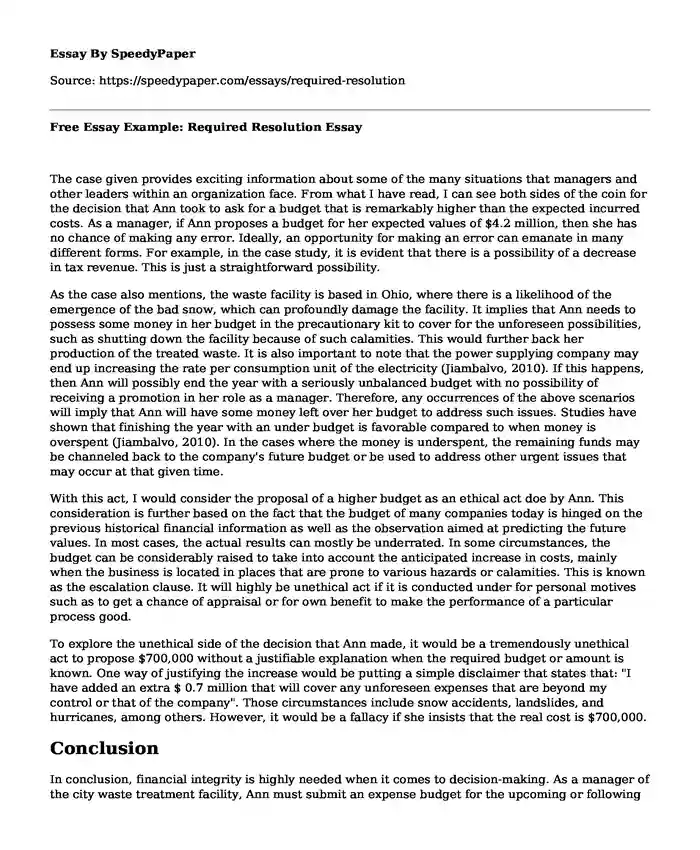
| Type of paper: | Essay |
| Categories: | Accounting Business management Personal leadership Leadership management |
| Pages: | 3 |
| Wordcount: | 824 words |
The case given provides exciting information about some of the many situations that managers and other leaders within an organization face. From what I have read, I can see both sides of the coin for the decision that Ann took to ask for a budget that is remarkably higher than the expected incurred costs. As a manager, if Ann proposes a budget for her expected values of $4.2 million, then she has no chance of making any error. Ideally, an opportunity for making an error can emanate in many different forms. For example, in the case study, it is evident that there is a possibility of a decrease in tax revenue. This is just a straightforward possibility.
As the case also mentions, the waste facility is based in Ohio, where there is a likelihood of the emergence of the bad snow, which can profoundly damage the facility. It implies that Ann needs to possess some money in her budget in the precautionary kit to cover for the unforeseen possibilities, such as shutting down the facility because of such calamities. This would further back her production of the treated waste. It is also important to note that the power supplying company may end up increasing the rate per consumption unit of the electricity (Jiambalvo, 2010). If this happens, then Ann will possibly end the year with a seriously unbalanced budget with no possibility of receiving a promotion in her role as a manager. Therefore, any occurrences of the above scenarios will imply that Ann will have some money left over her budget to address such issues. Studies have shown that finishing the year with an under budget is favorable compared to when money is overspent (Jiambalvo, 2010). In the cases where the money is underspent, the remaining funds may be channeled back to the company's future budget or be used to address other urgent issues that may occur at that given time.
With this act, I would consider the proposal of a higher budget as an ethical act doe by Ann. This consideration is further based on the fact that the budget of many companies today is hinged on the previous historical financial information as well as the observation aimed at predicting the future values. In most cases, the actual results can mostly be underrated. In some circumstances, the budget can be considerably raised to take into account the anticipated increase in costs, mainly when the business is located in places that are prone to various hazards or calamities. This is known as the escalation clause. It will highly be unethical act if it is conducted under for personal motives such as to get a chance of appraisal or for own benefit to make the performance of a particular process good.
To explore the unethical side of the decision that Ann made, it would be a tremendously unethical act to propose $700,000 without a justifiable explanation when the required budget or amount is known. One way of justifying the increase would be putting a simple disclaimer that states that: "I have added an extra $ 0.7 million that will cover any unforeseen expenses that are beyond my control or that of the company". Those circumstances include snow accidents, landslides, and hurricanes, among others. However, it would be a fallacy if she insists that the real cost is $700,000.
Conclusion
In conclusion, financial integrity is highly needed when it comes to decision-making. As a manager of the city waste treatment facility, Ann must submit an expense budget for the upcoming or following year. In her opinion, Ann would like to send an expense of a proposed budget that is about $700,000 higher than the facility's anticipated costs. A significant question that arises here is, thus, whether or not the decision is ethical. In reality, the decision would be viewed as a moral act if at all, Ann completely discloses her budget that depicts all the items and products that are budgeted for and which constitute to that increase. Additionally, the decision will be treated as ethical if Ann provides a comprehensive justification and explanations for the additional costs proposed. On the other hand, in any case, if Ann inflates her numbers by claiming that her fixed and variable costs are higher compared to their genuine value, then this decision would be utterly unethical and unacceptable. For example, if the variable cost per gallon is about $.20. In many cases, she raises the variable cost to $0.45, which constitutes an increase of 0.25, then it would be unacceptable. However, I believe that managers do not necessarily make the final decision in managerial accounting. Many businesses across the world have a well-structured mechanism where managers can make choices regarding how they want to spend their money. If Ann follows the appropriate channel, then she will be able to receive an increase in her proposal as ethics plays a small role when it comes to financial decision-making.
References
Jiambalvo, J. (2010). Managerial Accounting. New York, NY, USA: John Wiley & Sons
Cite this page
Free Essay Example: Required Resolution. (2023, Feb 22). Retrieved from https://speedypaper.net/essays/required-resolution
Request Removal
If you are the original author of this essay and no longer wish to have it published on the SpeedyPaper website, please click below to request its removal:
- Free Essay on Intervention Study
- Essay Sample on Summary of the Argument of Roger Cruton and Frederick Engels
- Free Essay Example: Nora the Town Girl
- Free Essay on Bendigo and Adelaide Bank External Environmental Factors
- Thakkar's Image of Africa
- Essay Sample on Contemporary Media and Identity
- Essay Sample on Ethics of Abortion
Popular categories




